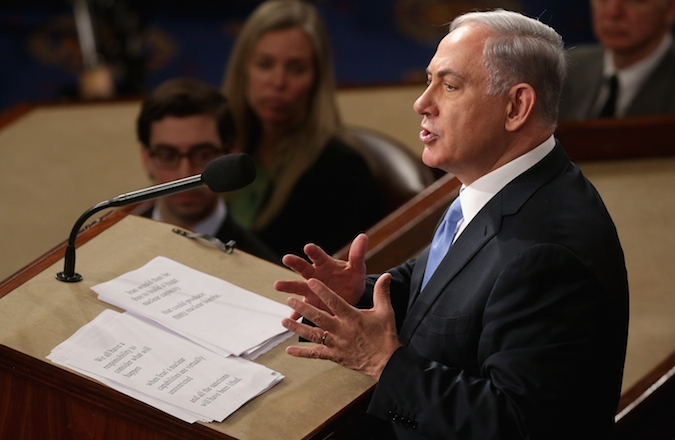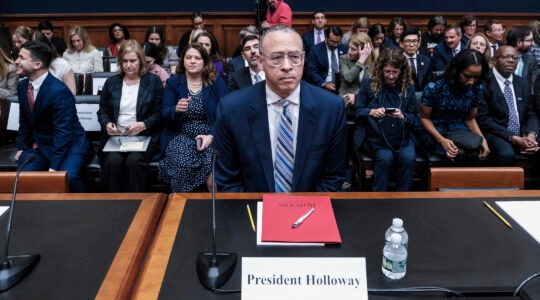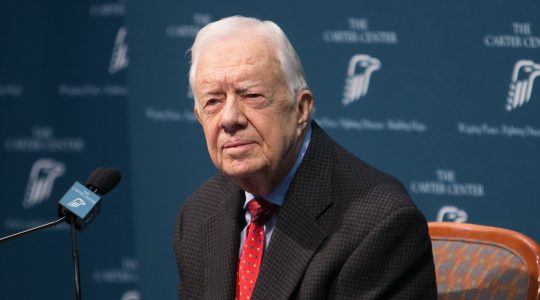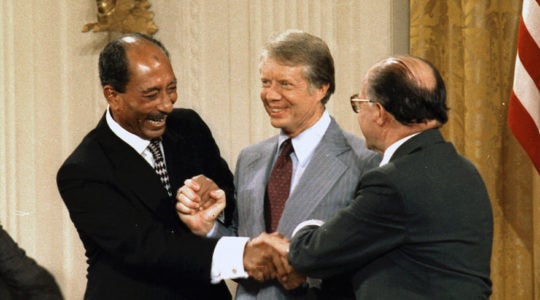WASHINGTON (JTA) – Israeli Prime Minister Benjamin Netanyahu’s speech, in the end, was about reminding Americans that the enemy of your enemy may still be your enemy.
He may have lost some friends in the process.
Netanyahu spoke before the U.S. Congress on Tuesday following a six-week buildup that spurred questions about the propriety of an Israeli prime minister using Congress as a platform for his views two weeks before elections in his country and resulted in a rupture, for now, between the Obama and Netanyahu governments.
“To defeat ISIS and let Iran get nuclear weapons would be to win the battle and lose the war,” Netanyahu said during his 45-minute address, referring to the Islamic State in Iraq and Syria, the terrorist group targeted by a U.S.-led coalition. “That is exactly what would happen if the deal currently being negotiated is accepted by Iran.”
Netanyahu spoke at the invitation of the House Speaker John Boehner (R-Ohio), who in a breach of protocol did not consult the White House, congressional Democrats or the American Israel Public Affairs Committee. No Obama administration officials attended the speech, and Vice President Joe Biden, who conventionally co-chairs such events with the House speaker, was out of the country.
“I know that my speech has been the subject of much controversy,” the Israeli leader said early in his address. “I deeply regret that some perceive my being here as political. That was never my intention.”
Netanyahu praised Obama for his support of Israel, eliciting a rare standing ovation for the president from both sides of the aisle. (Sheldon Adelson, the billionaire casino magnate who is a patron both to Netanyahu and the Republican Party and was present, did not clap.)
It was clear, however, that there were those on the Democratic side who remained unhappy with the speech. At least 60 lawmakers, including one Republican, chose not to go, and applause was often perfunctory on the Democratic side.
When Netanyahu strode up the center aisle of the U.S. House of Representatives chamber, it was mostly Republicans who rushed to shake his hand. Rep. Debbie Wasserman Schultz (D-Fla.), the chairwoman of the Democratic National Committee and one of the most prominent Jews and outspoken Israel supporters in the party, studiously hung back. So did Rep. Nancy Pelosi (D-Calif.), the minority leader in the House.
“As one who values the U.S.-Israel relationship, and loves Israel, I was near tears throughout the Prime Minister’s speech,” Pelosi said. “Saddened by the insult to the intelligence of the United States as part of the P5 +1 nations, and saddened by the condescension toward our knowledge of the threat posed by Iran and our broader commitment to preventing nuclear proliferation.”
The P5+1 is the acronym for the six major powers negotiating with Iran: The United States, Russia, China, Germany France and Great Britain.
Netanyahu received multiple standing ovations. However, at the point in which he came out most forcefully against the deal being negotiated, most Democrats remained seated, with some clapping politely, while many Republicans stood, whooped and hollered.
“This is a bad deal, it’s a very bad deal and we’re better off without it,” Netanyahu said.
Republicans said Netanyahu’s speech was a necessary tonic for talks that they say have been conducted without transparency.
“Prime Minister Netanyahu made clear how dangerous the direction of these negotiations really is,” Rep. Doug Lamborn (R-Colo.) said in a statement. “With two deadline extensions behind us, with the administration’s acquiescence to enrichment, and with a potential sunset clause of no more than 10-15 years in the agreement, we now know once and for all, this is a bad deal.”
Earlier in the week, there were reports that the Obama administration was worried that Netanyahu would reveal secrets that its negotiators had shared with the Israelis. Netanyahu in his speech said that the two main areas of the emerging agreement that concerned him were easily found in a Google search.
He said that the two likely outcomes — allowing Iran a limited uranium enrichment capacity and letting the deal lapse after a period of at least 10 years — would leave Iran a nuclear threshold state. Netanyahu instead counseled a deal that would require Iran to moderate its behavior, ending its regional troublemaking and backing for terrorism, and its threats against Israel.
Obama administration officials have said that demanding the dismantling of Iran’s enrichment capacity would collapse the talks, in part because it is seen as unrealistic by some of the major powers now squeezing Iran with sanctions. Additionally, the administration has said that any deal must have a period of duration, and it has resisted attaching non-nuclear issues to the talks, including Iran’s behavior in the region.
On Monday night, speaking to the American Israel Public Affairs Committee, Susan Rice, the U.S. national security adviser, confirmed reports that any deal would lapse after a set period. Rice said the term would be at least 10 years.
“I know that some question a deal of any duration,” she said, preempting whatever surprise Netanyahu may have reserved for his speech. “But it has always been clear that the pursuit of an agreement of indefinite duration would result in no agreement at all.”
A nuclear deal with Iran must include access to its nuclear facilities even after the expiry of restrictions “to provide the international community the assurance that it was not pursuing nuclear weapons,” Rice said.
While Netanyahu spoke, thousands of activists attending the AIPAC Policy Conference here this week visited Capitol Hill to lobby lawmakers’ offices on two bills that would subject the talks with Iran to greater congressional involvement. Obama has said he will veto both measures should they pass.
This year’s AIPAC conference — the pro-Israel lobby’s largest ever — drew 16,000 activists representing all 435 congressional districts. Speakers over the three days included congressional leaders from both parties and Samantha Power, the U.S. ambassador to the United Nations, along with Netanyahu and Rice.
There were sessions on everything from U.S.-Israeli cybersecurity cooperation to the Palestinians’ efforts on the international stage to Israel’s burgeoning craft brewery industry.
The primary focus of the conference and the lobbying efforts, however, was on Iran. And although much of the programming was indeed Iran-focused, the controversy surrounding Netanyahu’s congressional speech, and the blow it may have dealt to bipartisan support for Israel, surfaced repeatedly at the event.
After Netanyahu spoke, an Obama administration official told CNN that Netanyahu offered nothing new.
“Literally, not one new idea, not one single concrete alternative; all rhetoric, no action,” the network quoted the anonymous senior administration official as saying.
Obama himself has said that the fallout from the speech will not cause permanent damage. On Monday, the president told Reuters that he would meet Netanyahu again soon after Israel’s March 17 elections if Netanyahu is reelected.
JTA has documented Jewish history in real-time for over a century. Keep our journalism strong by joining us in supporting independent, award-winning reporting.






